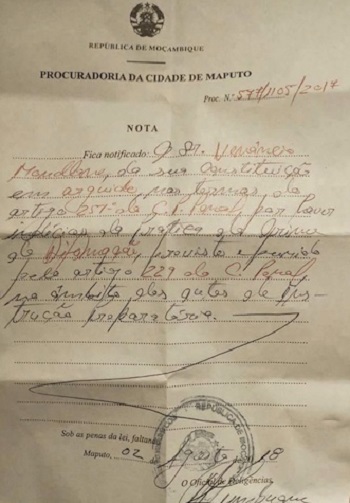Mozambique: Venâncio Mondlane on visit to Germany - AIM
Venâncio Mondlane named suspect in criminal defamation case – Mozambique

Picture: A Verdade
Out of the blue, the candidate standing as Renamo’s head of list in the Mozambican capital, Venâncio Mondlane, was last Thursday (August 2) appraised of the fact that he had been charged by the City of Maputo Attorney, as a result of “evidence of the crime of defamation” against an unidentified person, in “file number 577/1105/2017” – a move which could jeopardise his candidacy for the October municipal elections.
The prosecution says that the politician “is notified under article 251 of the Code of Criminal Procedure” and that the crime that he allegedly committed is “foreseen and punished by article 229” of the same provision, “in the context of the preliminary investigation briefs.”
A Verdade received a phone call from the defendant himself on Saturday (August 4), saying that he had not been interviewed by the entity that had notified him.
He assured us that he does not know the nature of the complaint, nor the identity of the complainant, nor the basis on which he is being accused. “I’ll present myself [at the Prosecutor’s Office], because I also want to know what’s going on,” he said.
Some of the public will no doubt see this as an attempt to prevent Mondlane from standing as a candidate in the forthcoming elections, and the suspects will be the same as usual.
However, without revealing any names or other details, the politician says he has a vague idea about who the complainant may be and why.
“I am also waiting for them [the Prosecutor’s Office] to tell me what have I done,” and against whom, our interlocutor said.
He said he was not scared because in 2013 he had faced a similar situation, in which the complainant “was Frelimo”, who accused him of having campaigned extemporaneously when a group of young people performed at the Maxaquene camp wearing T-shirts emblazoned with his photo, but without any slogan. “The process was filed due to lack of evidence,” he recalls.
Mondlane recently resigned from the Democratic Movement of Mozambique (MDM) and from the same party in parliament, for alleged “incompatibilities and constraints”.
In another development, Mondlane professed himself stunned by being formally accused and formally named a suspect [constituted ‘arguido’] after having left parliament, and just as he is preparing his strategy for local elections.
According to articles 174 (immunity) and 175 (irresponsibility) of the Constitution of the Republic, “no Member of Parliament may be detained or imprisoned, except in case of flagrante delicto, or submitted to judgement without the consent of the Assembly of the Republic”.
“In the case of a pending criminal case in which he is accused, the MP is heard by a Counsellor Judge” and the same deputy will be under the regime of “Specific Jurisdiction and is judged by the Supreme Court, according to the law”.
In addition, the Constitution establishes that the Members of Parliament cannot be prosecuted, detained or judged by the opinions or votes cast in the exercise of their function of deputy.
However, “civil liability and criminal liability for insult, defamation or slander are excepted”.
In this context, Mondlane has no doubt that he is being “hunted” because he no longer has immunity, but at the same time he does not understand why he was not notified much earlier because the “Constitution of the Republic provides for situations” where it can “require parliament to lift immunity” so that criminal proceedings against an MP can proceed.
Mondlane provided examples of parliamentarians who had been the targets of such a procedure.
By Emildo Sambo
Procuradoria da Cidade de Maputo “caça” Venâncio Mondlane
Sem ter sido ouvido, o cabeça-de-lista da Renamo na capital moçambicana, Venâncio Mondlane, foi na última quinta-feira (02) notificado do facto de ter sido constituído arguido pela Procuradoria da Cidade de Maputo, por “haver indício de crime de difamação” contra uma pessoa não identificada, no “processo número 577/1105/2017”, o que pode colocar em causa a sua candidatura às eleições autárquicas a realizarem-se no dia 10 de Outubro.
A procuradoria diz que o político “fica notificado nos termos do artigo 251 do Código do Processo Penal” e o crime que supostamente cometeu é “previsto e punido pelo artigo 229”, do mesmo dispositivo, “no âmbito dos autos de instrução preparatória”.
O @Verdade apurou, telefonicamente, do próprio arguido, no sábado (04), que não foi ouvido pela entidade que o notificou.
Ele assegurou-nos que não conhece a natureza da queixa, nem a identidade do queixoso e tão-pouco o fundamento para ser constituído arguido. “Vou-me apresentar [à Procuradoria] porque também desejo saber o que se passa”.
Alguma opinião pública não tem dúvidas de que este processo é uma tentativa de impedir a concorrência do visado nos pleitos eleitorais que se avizinham. Os suspeitos podem ser os mesmos de costume.
Venâncio Mondlane disse-nos que a Procuradoria da Cidade de Maputo não lhe esclareceu quem é o queixoso, nem que prática ele cometeu e que consubstancie difamação.
Todavia, sem revelar o nome e muito menos avançar pormenores, o político assegurou que tem uma ideia vaga sobre quem pode ser o queixoso e por que razão.
“Estou à espera também que me digam [a Procuradoria] o que é que eu fiz” e contra quem, disse o nosso interlocutor.
Ele afirmou que não está assustado porque em 2013 passou por uma situação similar, em que o queixoso “era a Frelimo”, que o acusava de ter feito campanha eleitoral extemporânea, quando um grupo de jovens se apresentou no campo de Maxaquene trajado de camisetas com a sua foto estampada, mas sem quaisquer dizeres políticos. “O processo não avançou por falta de matéria (…)”.
Ocorre que, recentemente, Venâncio Mondlane desistiu do Movimento Democrático de Moçambique (MDM) e renunciou a deputado pela bancada do mesmo partido na AR, por alegadas “incompatibilidades e constrangimentos (…)”.
Num outro desenvolvimento, ele mostrou-se estupefacto com o facto de ter sido constituído arguido depois de se afastar do Parlamento e numa altura em que está a preparar a sua estratégia para as eleições autárquicas.
Segundo os artigos 174 (imunidade) e 175 (irresponsabilidade) da Constituição da República, “nenhum deputado pode ser detido ou preso, salvo em caso de flagrante delito, ou submetido a julgamento sem consentimento da Assembleia da República”.
“Tratando-se de processo penal pendente em que tenha sido constituído arguido, o deputado é ouvido por um juiz conselheiro” e o mesmo deputado “goza de foro especial e é julgado pelo Tribunal Supremo, nos termos da lei”.
Ademais, a Lei-Mãe estabelece que os deputados da AR não podem ser processados judicialmente, detidos ou julgados pelas opiniões ou votos emitidos no exercício da sua função de deputado.
Porém, “exceptuam-se a responsabilidade civil e a responsabilidade criminal por injúria, difamação ou calúnia”.
Neste contexto, Mondlane não tem dúvidas de que está a ser “caçado” por já não ter imunidade, mas ao mesmo tempo não percebe por que motivo não foi notificado muito antes porque a “Constituição da República prevê as situações” em que se “pode requer ao Parlamento a quebra de imunidade” para que determinado processo-crime instaurado contra um deputado tenha o devido andamento.
A nossa fonte contou, a título de exemplo, alguns casos em que certos parlamentares foram alvos desse procedimento.












Leave a Reply
Be the First to Comment!
You must be logged in to post a comment.
You must be logged in to post a comment.